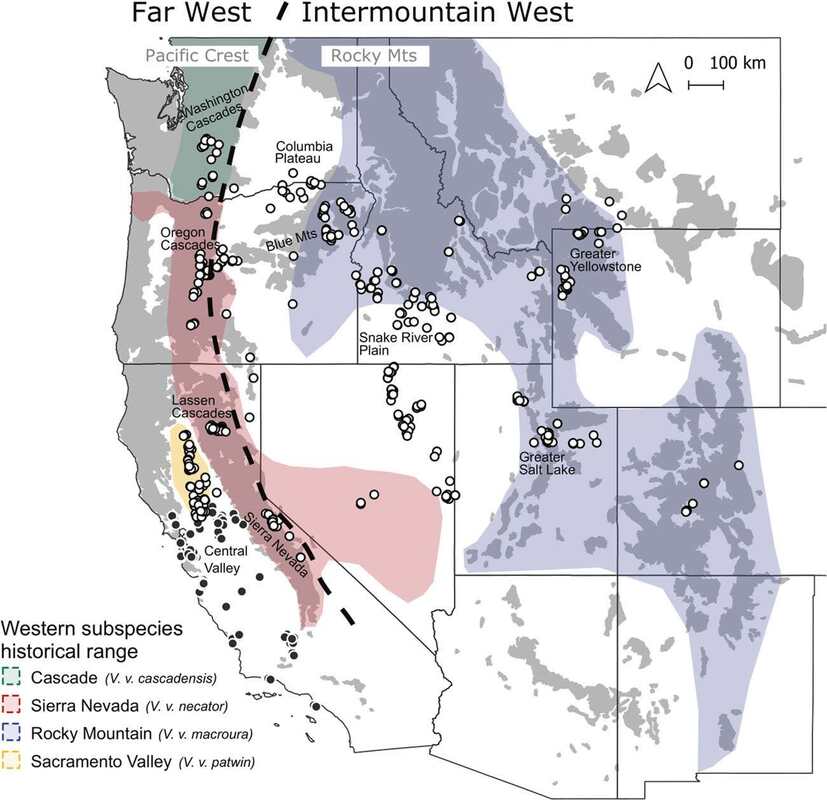CONTEMPORARY WILDLIFE MANAGEMENT DECISIONS ARE COMPLEX
Wildlife Ecology Institute is a 501(c)(3) non-profit wildlife research and education organization composed of wildlife ecologists with real-world management, applied research, quantitative, and GIS skills to support state and federal agency wildlife and habitat management needs. We fill gaps in knowledge through applied research that directly benefit wildlife management and conservation decisions, as these decisions must be informed and defensible now more than ever. We provide the products that our funding agencies can actually use.
We are not restricted geographically, by taxa, or by ecosystem. We work in montane forests, deserts, agricultural systems, on game species, state and federal threatened and endangered species, invasive species, and data-deficient species; and under diverse situations, including climate change, wildfire, drought, energy development, harvest, and others. We fully support the North American Model of Wildlife Conservation.
We work very closely with state fish and wildlife agencies; federal agencies such as the U.S. Fish and Wildlife Service, U.S. Forest Service, USDA APHIS Wildlife Services, and Bureau of Land Management; and other non-profit organizations, including the Association of Fish and Wildlife Agencies.
BRIDGING GAPS IN MANAGEMENT AND CONSERVATION EDUCATION
Our Institute was formed in response to the substantial and increasing need for quality research that directly addresses real-world management issues. This need has arisen largely because academia has undergone a paradigm shift away from applied research focused on solving management issues. This shift also impacts the training of our future wildlife professionals. The Wildlife Ecology Institute bridges the gap between wildlife management and research, supporting informed and defensible management decisions. We also train our future professionals, particularly for agency positions. The need is great, so we are not doing this alone. Check back for our developing partnerships.
We are also working to develop experiential and team-building educational programs to fill these gaps so entry-level biologists receive the proper training to function in today's technical work environment. This will not only benefit future professionals, but also state and federal agencies. Our educational goals are not limited to undergraduate and graduate-level students, as we are also actively involved with K-12 programs and conservation programs that involve families as a way to disseminate important ecological and management issues.
Wildlife Ecology Institute is a 501(c)(3) non-profit wildlife research and education organization composed of wildlife ecologists with real-world management, applied research, quantitative, and GIS skills to support state and federal agency wildlife and habitat management needs. We fill gaps in knowledge through applied research that directly benefit wildlife management and conservation decisions, as these decisions must be informed and defensible now more than ever. We provide the products that our funding agencies can actually use.
We are not restricted geographically, by taxa, or by ecosystem. We work in montane forests, deserts, agricultural systems, on game species, state and federal threatened and endangered species, invasive species, and data-deficient species; and under diverse situations, including climate change, wildfire, drought, energy development, harvest, and others. We fully support the North American Model of Wildlife Conservation.
We work very closely with state fish and wildlife agencies; federal agencies such as the U.S. Fish and Wildlife Service, U.S. Forest Service, USDA APHIS Wildlife Services, and Bureau of Land Management; and other non-profit organizations, including the Association of Fish and Wildlife Agencies.
BRIDGING GAPS IN MANAGEMENT AND CONSERVATION EDUCATION
Our Institute was formed in response to the substantial and increasing need for quality research that directly addresses real-world management issues. This need has arisen largely because academia has undergone a paradigm shift away from applied research focused on solving management issues. This shift also impacts the training of our future wildlife professionals. The Wildlife Ecology Institute bridges the gap between wildlife management and research, supporting informed and defensible management decisions. We also train our future professionals, particularly for agency positions. The need is great, so we are not doing this alone. Check back for our developing partnerships.
We are also working to develop experiential and team-building educational programs to fill these gaps so entry-level biologists receive the proper training to function in today's technical work environment. This will not only benefit future professionals, but also state and federal agencies. Our educational goals are not limited to undergraduate and graduate-level students, as we are also actively involved with K-12 programs and conservation programs that involve families as a way to disseminate important ecological and management issues.
RECOVERING AMERICA'S WILDLIFE ACT
The Alliance for America's Fish & Wildlife was created to bring about a fundamental change in how conservation is funded in order to protect and conserve our fish and wildlife for the benefit of our nation, our economy and our way of life.
The bipartisanRecovering America’s Wildlife Act is legislation needed to prevent more than 12,000 species of fish and wildlife from becoming endangered. Please join our effort and ask your member of congress to co-sponsor the Recovering America’s Wildlife Act. Wildlife Ecology Institute is a partner that signed a letter in support of the Recovering America's Wildlife Act.
The bipartisan
SEVERAL NEW PROJECTS AND CAREER OPPORTUNITIES!
We are working to catch our website up with what's going on - several new projects will be posted soon!
If you are interested in applying for an open position, please check our Facebook page, LinkedIn page, or TWS Career Center (and be sure to follow application directions!)
If you are interested in applying for an open position, please check our Facebook page, LinkedIn page, or TWS Career Center (and be sure to follow application directions!)
NEW ARTICLE!
Contrasting genetic trajectories of endangered and expanding red fox populations in the western U.S. Click here.
Now you can Like and Share us on
Copyright 2024 Wildlife Ecology Institute

